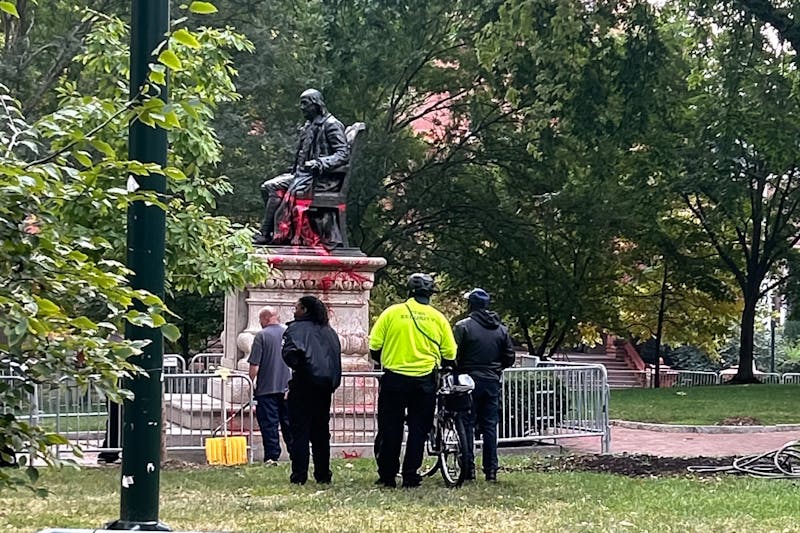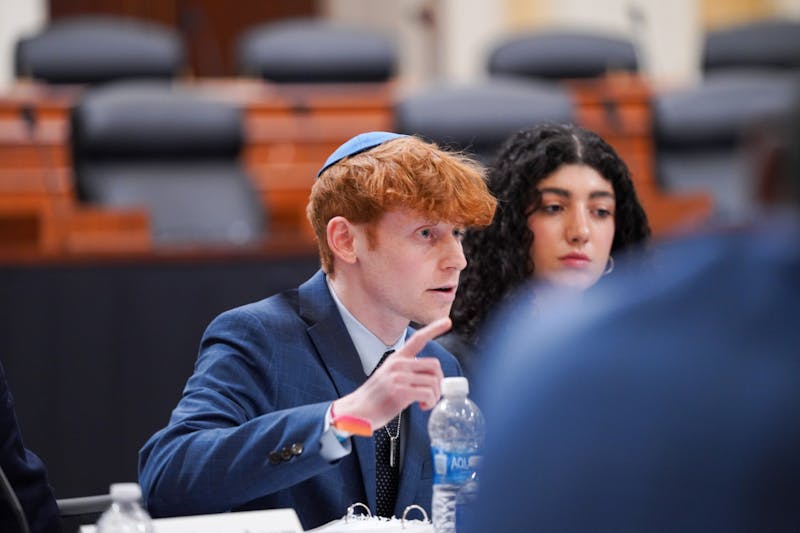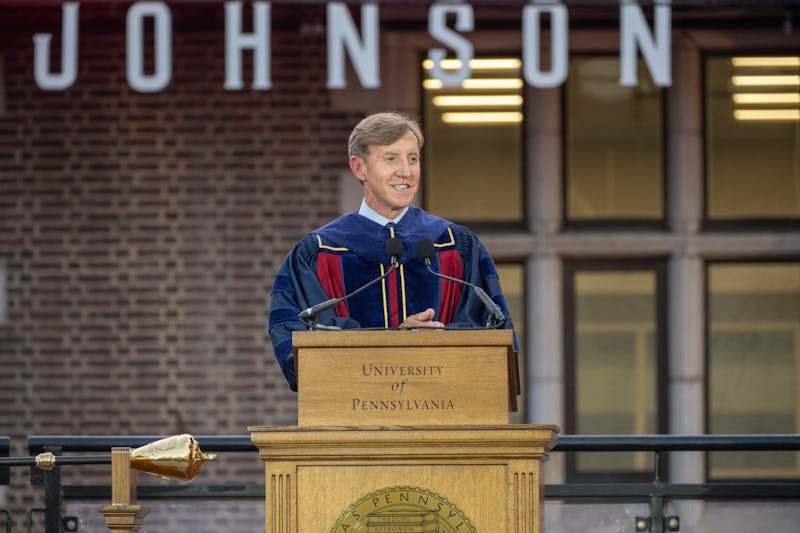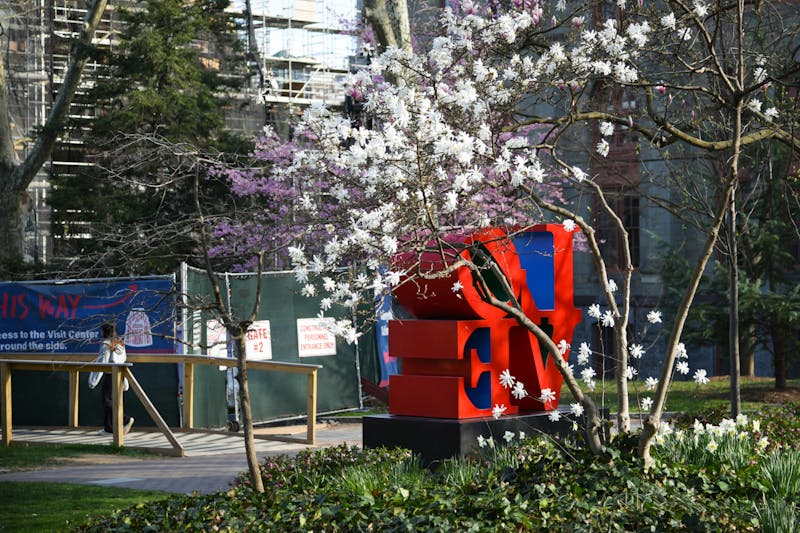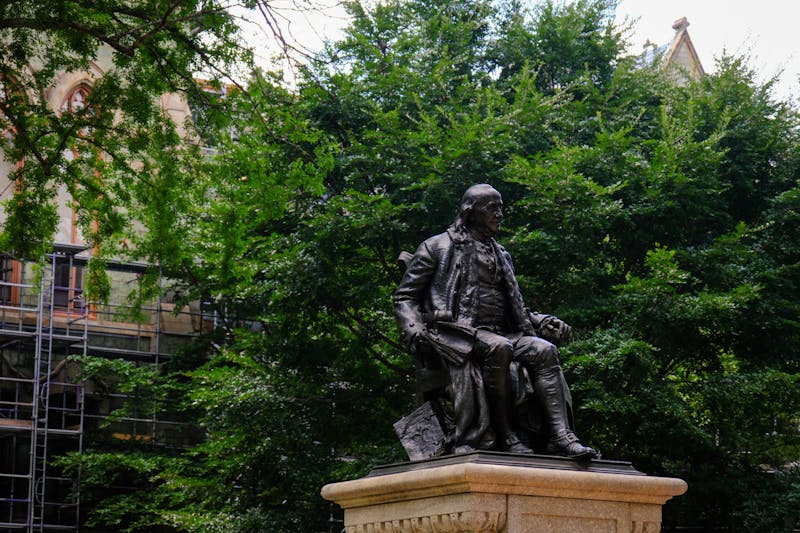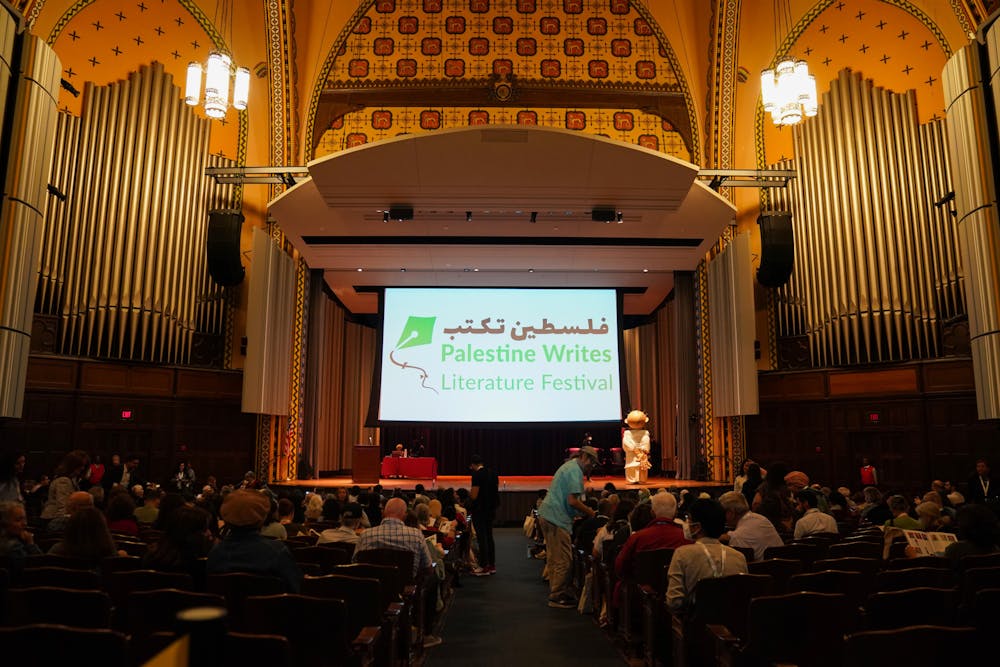
The Palestine Writes Literature Festival would be open to holding its next conference on Penn’s campus, a festival spokesperson told The Daily Pennsylvanian.
Palestine Writes, a celebration of Palestinian artists and writers, was first held virtually in 2020 and then on Penn's campus in September 2023. In a written statement provided to the DP, the spokesperson said that the festival is intended to take place every three years — and while organizers would "love" to host the 2026 conference at Penn, they said that the decision hinges on “the university's tolerance for Palestinian humanity, for which it clearly has very little currently.”
“Even though we were invited to hold our 2023 festival at Penn, we were harassed and mistreated by the administration, under pressure from their donors and members of their community who cannot abide expressions of Palestinian indigeneity and cultural productions,” the spokesperson wrote.
A University spokesperson declined to comment. It remains unclear whether the University would allow Palestine Writes to return to campus for a second festival — over the summer, Penn implemented new temporary open expression guidelines which could make registering an event on campus more difficult, according to a DP analysis.
Palestine Writes held a three-day event on campus from Sept. 22 to Sept. 24 last year, with Irvine Auditorium and other University buildings hosting demonstrations of Palestinian culture including dance performances, spoken poetry, and scholarly presentations. Most festival participants emphasized the deep roots of their culture, while calling for an independent Palestinian state and criticizing European legacies of settler colonialism.
The Palestine Writes spokesperson wrote that the festival celebrated cultural practices that are “inextricably bound to the land” and “vary from one region of Palestine to another based on elements of nature in each region.”
“That was ultimately the biggest offense of our festival, because we showed up with the receipts of that heritage, which obliterates zionist mythos and exposes their project for what it is: a violent foreign settler colony,” the spokesperson said.
The DP reported that the 2023 festival sold over 1,500 tickets and came close to hitting its fundraising goal. Since the festival was held last year, organizers have raised over $27,000 for post-festival support through a donation page on the website for Playgrounds for Palestine, a nonprofit organization that has erected parks for children in the Middle East.
"We want to cover our costs and hold this festival again and again," a note appended to the donation page reads. "And we will."
Last year, the University faced public controversy for allowing the festival to take place on its campus, with dozens of donors and community members accusing several festival speakers of antisemitism, pointing to past comments by Pink Floyd co-founder Roger Waters and academic Marc Lamont Hill.
Those concerns were acknowledged in a Sept. 12, 2023 statement from Penn President Liz Magill, Provost John Jackson Jr., and School of Arts and Sciences Dean Steven Fluharty, who wrote that they "unequivocally — and emphatically — condemn antisemitism as antithetical to our institutional values." The statement came after Penn Hillel Executive Director and Rabbi Gabe Greenberg said that he had engaged with administrators given speakers’ past statements on Jews, Israel, and Zionism.
"As a university, we also fiercely support the free exchange of ideas as central to our educational mission," the administrators wrote. "This includes the expression of views that are controversial and even those that are incompatible with our institutional values.”
After administrators addressed the festival, controversy intensified over Magill’s response, which was simultaneously decried as insufficient and excessive, respectively, by pro-Israeli and pro-Palestinian community members — foreshadowing the circumstances that would later prompt her resignation.
As pro-Israel students, faculty, and alumni called for the University to adopt a stronger tone against antisemitism, other Penn community members voiced support for the festival, including a Sept. 17, 2023 letter signed by 36 faculty members which expressed “deep concern” about Magill’s statement. Several signatories who spoke with the DP criticized Penn for allegedly conflating support for Palestine and criticism of Israel with antisemitism, emphasizing the importance of welcoming a discussion on Palestinian literature.
In an interview with the DP in September, Interim Penn President Larry Jameson declined to give a definitive answer when asked whether he would allow another Palestine Writes festival to take place on campus.
"It's hard to know without having all the information that was available and the details,” Jameson said, emphasizing the importance of relevance of the “forward looking” actions proposed through Penn's task force on antisemitism and Presidential Commission on Countering Hate and Building Community.
Still, several faculty members who spoke with the DP noted the challenges of holding the festival on campus a second time.
Harun Küçük, a History and Sociology of Science professor and former director of the Penn Middle East Center, told the DP that additional safety concerns would make it more difficult to bring speakers to campus. Küçük resigned from his role as MEC director last fall, citing alleged violations of academic freedom by Penn's administration.
“If we were to bring in speakers — because the Middle East, I think, as a whole now, is a touchy subject — we would have to bring in security and pay for security for every single event,” Küçük said. “I think right now it's basically impossible to hold a Middle East-related event on campus unless you have a lot of money.”
David Kazanjian, an English professor and American Association of University Professors-Penn communications secretary, told the DP that he has seen a “chill on the exercise of academic freedom, both among students and faculty, and general free speech on campus” in the year since Palestine Writes.
Kazanjian claimed that the University has “cracked down so severely on events that have tried to pick up on some of the threads of the Palestine Writes [Literature] Festival.” He added that Penn’s temporary guidelines, which the University announced in June, have caused “extreme concern” within AAUP’s national body and make it unlikely that another festival could occur.
According to the DP's analysis, the temporary guidelines include increased regulations on reserving University spaces for events and state that non-University affiliated individuals may have “less expansive” rights than Penn community members.
The new guidelines include a provision that unless “stated otherwise,” events are “presumed to be private, that is, limited to members of the Penn community.” This default privacy policy contradicts the existing Guidelines on University Expression, which state that “[u]nless designated as public, meetings are considered to be private. Events are considered to be public.”
According to Kazanjian, the broadness of the temporary guidelines means that Penn could suppress “gatherings, events, protests on any number of topics on campus, including, you know, cultural events that might try to represent a certain cultural tradition or community.”
He added that AAUP does not view the temporary guidelines as legitimate because they were adopted without faculty input.
When asked if the festival could happen in the future on campus, Kazanjian said that it was unlikely.
“I think it would be hard for three people to meet on Locust Walk and express a public opinion that the University wanted to suppress, so I can't imagine holding a multi day conference on [that] topic,” he said.
Professor emeritus of Arabic Languages and Literature Roger Allen wrote in a statement to the DP that the festival last September "offered a valuable, indeed pioneering, opportunity to hear about a much neglected culture, that of the Palestinian people."
“It seemed to be a wonderful [multi-day] event and an opportunity for Penn to show its sense of balance in times of strife and an awareness of the sheer variety of the world's cultures,” he wrote.
The Palestine Writes spokesperson ended their statement by describing their "sincere wish for Penn to become the place it purports to be — one of freedom, dissent and debate, political and cultural expression, inclusions, and, more importantly, a locus where our nation's youth, especially the disempowered and marginalized wellspring of human idealism, can speak truth and morality to power and greed."
Staff reporters Ethan Young and Alex Slen contributed reporting to this article.
The Daily Pennsylvanian is an independent, student-run newspaper. Please consider making a donation to support the coverage that shapes the University. Your generosity ensures a future of strong journalism at Penn.
Donate







